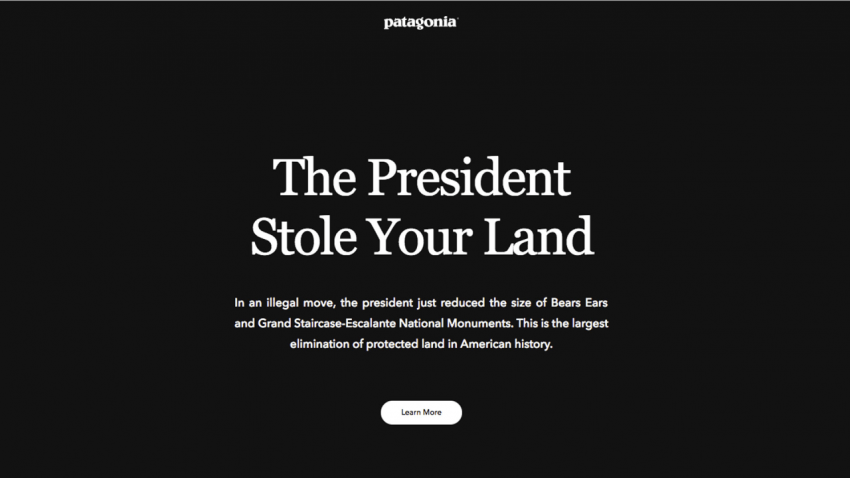Last month, Patagonia weighed in publically on President Donald Trump’s recent executive orders to dramatically shrink Bears Ears and Grand Staircase-Escalante National Monuments, boldly proclaiming “The President Stole Your Land” in social media posts and an email to customers.
Tempting as it may be to regard the outdoor apparel company’s salvo as a sign of our hyper-partisan times—or a shout out to a customer base that likely includes few supporters of the current Administration—our reading of events finds that Patagonia’s actions were practical, measured and, above all, authentic. We believe that the company’s actions constitute an instructive case study on when and how businesses should speak out on public policy:
Patagonia has long had a dog in this fight – While businesses often assert that a given social issue is core to their values or mission, Patagonia has advocated for the preservation of public lands for almost 30 years. For a company incorporated a mere 45 years ago, this represents two-thirds of its existence. Among the company’s achievements to date is helping to establish several national monuments, including Bears Ears National Monument, as well as Basin and Range and Gold Butte National Monuments.
Values are important, but are often generic and malleable. Consequently, values alone provide even the most well-intentioned business with little currency when tackling a social issue. However, a business with a history of demonstrating its values, particularly with a track record of accomplishment, has inexorable license to speak and to act. It is this measure of authenticity that is most valued by key stakeholders, in addition to being a prime resource in achieving a business’ desired social outcomes.
Also, Patagonia’s essential utility is to enable people to enjoy the outdoors, not least on public lands—a resource reduced by roughly two million acres as a result of the executive orders. Had the company not lent its voice to the resultant public discourse, while endeavoring to reverse the course of action, one could reasonably argue that it failed to make good on a core responsibility.
The company took a stand without grand standing – There is no shortage of businesses that have taken aim at President Trump for his executive orders ranging from the travel ban or the transgender military ban—with some CEOs reprimanding the commander-in-chief for his lack of values.
In contrast, Patagonia’s public overture amounted to a straightforward recitation of key facts and a call-to-action. Whereas many CEOs would seize upon the moment as a thought leadership opportunity, Rose Marcario, to her credit, recognized that the effort to thwart the executive orders wouldn’t benefit from her imprimatur—especially given President Trump’s penchant for taking to Twitter to criticize high-profile individuals.
Although the claim that the nation’s public lands have been “stolen” is based on a particular reading of the law, the company thereafter limited its messaging to the enumeration of data pertaining to the economic impact of the outdoor industry, the percentage of public lands currently open to oil and gas leasing and development and the widespread public support for protecting federal public lands.
It is noteworthy that Patagonia didn’t make a value judgment about the oil and natural gas industry—a popular bogeyman of environmentalists—opting instead to provide a dispassionate, statistical overview of leasing and development on public lands. In lieu of ideological rhetoric, Patagonia invoked the words of Theodore Roosevelt—a Republican president responsible for establishing the United States Forest Service and five National Parks.
Patagonia is part of a diversified coalition seeking a common solution – There is strength in numbers, not to mention diversity, when given the formidable challenge of overturning two sweeping executive orders. Patagonia belongs to a group it characterizes as “350 businesses, conservation groups and Native American tribes that have come together on this issue to protect public lands.”
Due to the breadth of its members, the coalition is capable of mounting a full court press to prevent the reduction of public lands at Bears Ears and Grand Staircase-Escalante National Monuments. To that end, Patagonia leveraged the strength of its customer base to call popular attention to the effects of the executive orders, while other members of the coalition attested to their environmental and economic impacts. Still other members have presumably reached out to allies in state and federal government to urge the Administration to reconsider its actions.
Also, Patagonia has pledge to file a lawsuit against the Administration that will be joined by numerous non-profit organizations. Another suit is to be brought by the Inter Tribal Coalition.
Businesses have a fiduciary responsibility to speak out on issues that are critical to their self-interests—no matter the prevailing political climate or White House occupant. However, when a business’ priority is also a societal priority, both the opportunities and risks of taking a public stand are compounded, especially given the rise of identity politics and groupthink in the social media age.
Patagonia’s response to the Administration’s actions was well conceived and well executed. Given the company’s business model and historic role in preserving public lands, along with its reasonable temperament, Patagonia belongs in the thick of any integral effort to rollback the executive orders. ![]()
